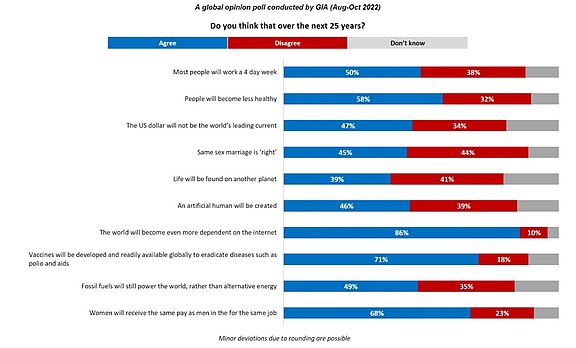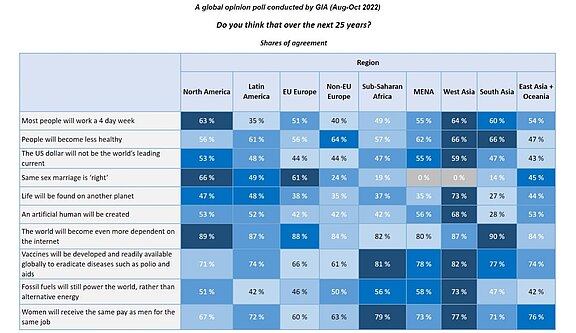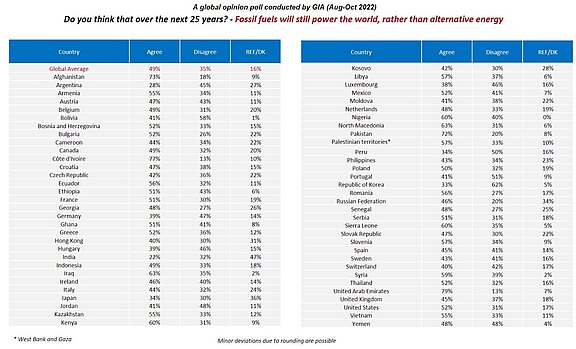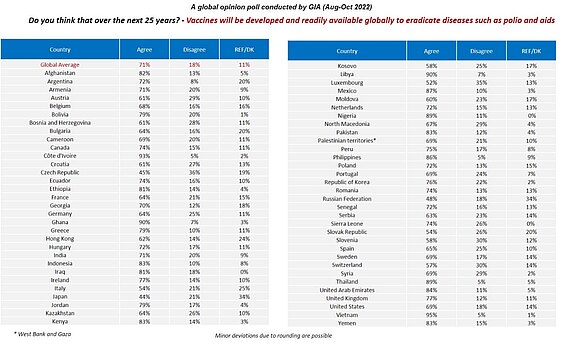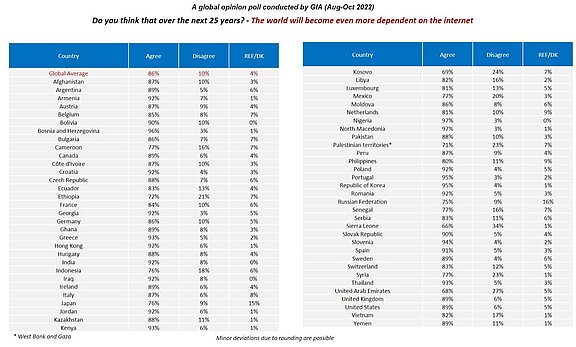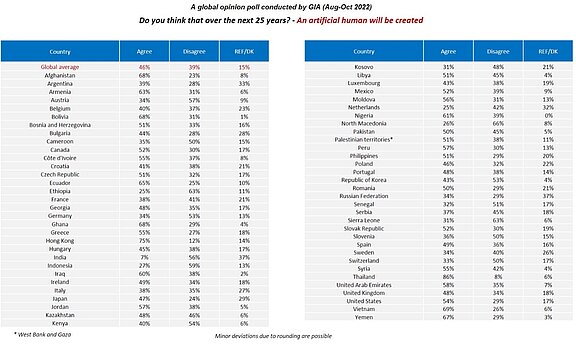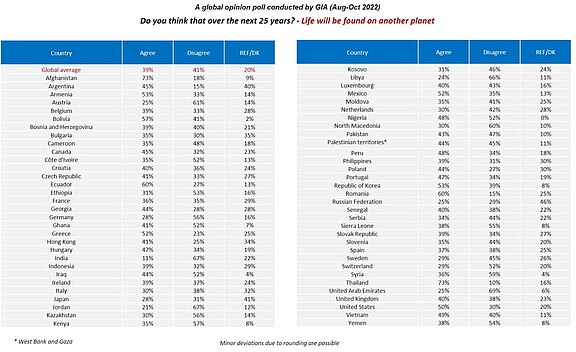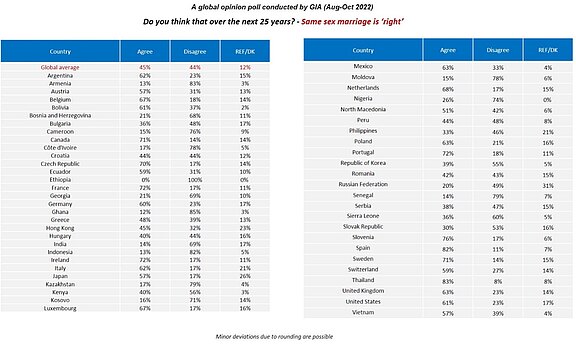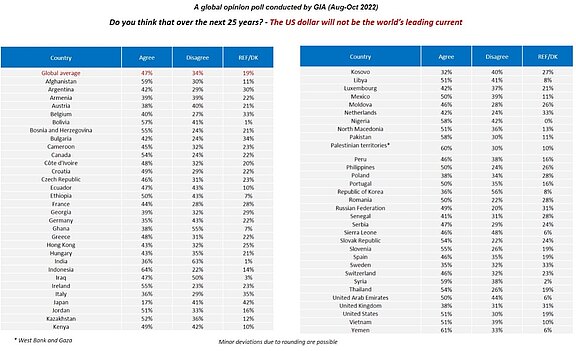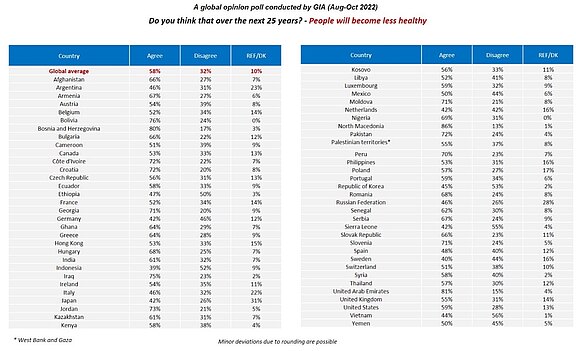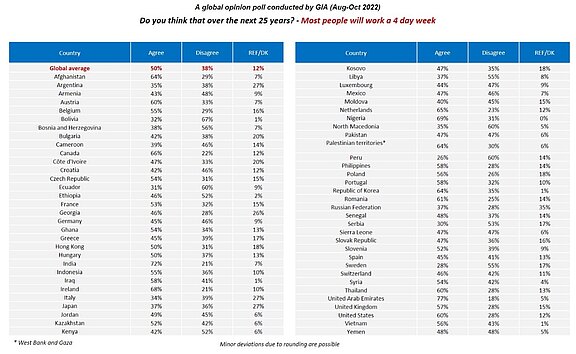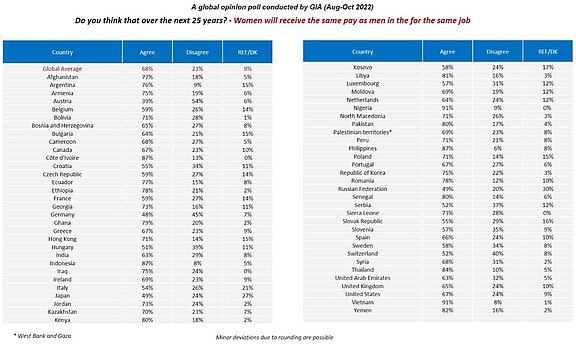These are some of the highlights from the 75 years jubilee poll conducted by Gallup International Association (GIA), covering about two thirds of the global population (and more than 90% of those countries which are free to conduct and publish opinion research). The poll celebrates GIA’s 75th anniversary.
Healthier life and medical technology
More than a half (58%) of the global population agrees that over the next 25 years people will actually become less healthy. A third disagrees while 10% are undecided. The regions that agree to a lesser extent are East Asia and Oceania, EU Europe and North America, whereas the rest of the Asia region is among the regions agreeing the most. Attitudes are often a reflection of a variety of circumstances, like people’s views on the current quality of life, orientations towards healthy habits and their national healthcare systems and life standards.
People in countries like North Macedonia, for example, UAE, Bosnia and Herzegovina, Bolivia, Iraq, etc. seem most confident that humanity will become less healthy – 70 – 80%+. Least prone to agree with such a statement seem people in states like Indonesia, Sweden, Germany, the Netherlands, Sierra Leone, etc. with shares of only around 40%.
People around the world however agree that relatively soon there will be vaccines that will help in eradicating diseases that are currently hard to cure. 71% of respondents asked are positive that over the next 25 years vaccines are going to be available to eradicate diseases such as polio and AIDS. 18% of the respondents disagree and just over a tenth are still unsure. The European regions tend to be a bit more sceptical to that statement than other regions surveyed. In Europe there is also a noticeably higher share of indecisive respondents. Low-income economies seem more hopeful on this matter than wealthier countries. Perhaps there is more hope, where it is more needed – as low-income economies are disproportionately impacted by these diseases.
People in countries like Vietnam, Côte d'Ivoire, Ghana, Thailand and Philippines stand out with shares up to 80 – 90% as most prone to believe that soon there will be available vaccines to eradicate diseases that are hard to cure. Most doubtful seem people in Japan, Czech Republic, Russian Federation, Luxemburg and Italy.
What is right and what is a right
Most people agree that in the next 25 years a 4-dayworking week will be the norm around the world. 50% of the respondents in the GIA’s Global Survey say that the majority of us will start working 4 days a week only within the next couple of decades. 38% are rather doubtful and 12% refuse or do not know. People in North America, South Asia, MENA, East Asia/Oceania and the EU are more confident that a 4-working day week will be available for most people over the next 25 years. Latin America and non-EU Europe, followed by Sub-Saharan countries tend to agree less than other regions. The region with the highest share of answers “Do not know” is non-EU Europe, where almost one fifth cannot take a stand. The statement also shows visible (although not dramatic) differences in responses by personal income and education – those with higher education and income are more likely to expect a shorter working week in the future.
Confidence in a 4-day working week is considered most likely in UAE, India, Ireland and Canada with shares of agreement up to 70%. Citizens of Peru, Sweden, Ecuador and Italy for example are much more doubtful.
Same sex marriage as a right clearly divides the world in two halves. 45% of the respondents around the world think that over the next quarter of a century same sex marriage will be a recognised right. Yet 44% disagree. The rest cannot tell. It should be noted that the statement was not tested in MENA and West Asia, including Afghanistan, Iraq, Israel, Jordan, Libya, Palestinian territories (West Bank and Gaza), Syria, United Arab Emirates and Yemen. The regions agreeing with this statement are primarily North America and EU Europe, and the regions disagreeing the most are South Asia and Sub-Saharan countries, followed by non-EU Europe. Age seems not to be among the defining characteristics in terms of attitudes towards same sex marriage. Income and education however are – visibly more people with higher income and education expect that in 25 years same sex couples’ marriage will be considered right. Most defining drivers of opinion on this issue, of course, are religion, different cultural backgrounds and national characteristics/traditions.
Thailand, Spain, Slovenia, Ireland and France are among the top countries to believe this statement. On the opposite side stand out countries like Armenia, Indonesia and India and Senegal with much smaller shares of agreement.
There are slightly more people around the world believing that in the next 25 years polio and AIDS will be eradicated than people who believe women will receive the same payment as men for the same job done. 68% of respondents asked agree that in the foreseeable future women will be paid equally. 23% however disagree and 9% cannot say. Interestingly, Europeans (both countries in EU and non-EU countries) and respondents in North America appear a bit more sceptical and indecisive, but even there the share of those who expect equal payment for men and women for the same job is near two thirds. Most confident in equal payment in the future seem to be people in Sub-Saharan Africa, West Asia and East Asia/Oceania. Younger generations, people with higher income and people with higher education are more confident that men and women will soon have equal wages. Country-wise however most optimistic are low-income countries, while high income nations seem more hesitant. And women themselves are a bit less optimistic for equal payment.
People in Nigeria, Vietnam, Philippines, Côte d'Ivoire etc. seem most convinced that women will be paid equal as men. Least prone to believe in this seem people in Austria, Germany, Japan, Russia and others.
Economy
Almost half of the people in different nations around the world feel that the US dollar will lose its role as the world’s leading currency over the next 25 years. 34% are of the opposite opinion while 19% are unsure. The statement is agreed with primarily in West Asia, followed by MENA. Worth noting is the fact that 53% in North America agree with this statement, whereas one fifth are undecided. In both EU and non-EU countries the share of those who expect that the dollar will no longer be world’s leading currency is near a half of all respondents.
Some of the top countries to agree with this statement are Indonesia, Yemen, Palestinian territories, Syria and Afghanistan. People from Japan, Kosovo, Germany, Sweden etc. seem the least convinced.
Half of the people worldwide believe that in 25 years fossil fuels will still power the world, rather than alternative energy sources. 35% do not agree. 16% unsure. West Asia appears most convinced by the role of fossil fuels – with more than 7 in 10 agreeing that fossil fuels will remain the main energy source. Latin America is the most sceptical region, where more than 4 out of 10 disagree with the statement. It seems that the EU, with its green transition, has not been able to fully convince its citizens – 46% say that fossil fuels will remain leading in the near future while37% disagree. Low-income economies as a whole seem more likely to say that fossil fuels will preserve their place in our lives over the next 25 years.
Most people agreeing with this statement are in UAE, Côte d'Ivoire, Afghanistan, Pakistan, etc. The Lowest shares of agreement is registered for instance in countries like India, Argentina, South Korea, Japan and Peru.
Beyond humanity …
As technology is progressing the internet becomes more and more essential in our lives. 86% of the people asked agree that the world will become even more dependent on the internet, which makes this statement the one that almost everybody agrees upon. The difference in opinions on this issue are not geographically defined, rather more demographic. Low-income countries, for instance, think to a lesser extent that we will become even more dependent on the internet over the next 25 years – 77%. So do the less educated people all over the world.
“An artificial human will be created” in the next quarter of a century believe 46% of our global survey participants, 39% disagree and 15% cannot tell. West Asia (Afghanistan) tends to agree to a much higher extent than other regions. Approximately one fifth in the European regions and in East Asia + Oceania are still undecided.
The same pattern is to be seen for the statement “Life will be found on another planet” – also for this question West Asia tend to be more positive. 39% worldwide agree and 41% are on the opposite opinion. 20% cannot tell.
Both statements gain relatively more support from younger generations. Religious beliefs also correlate with opinions towards extra-terrestrial life and creating artificial humans.


